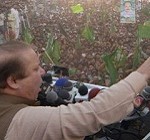The world should celebrate the fact that the military in Pakistan kept to its barracks for five long years and allowed the country its first handover from one civilian government to another. It is no mean feat for a nation replete with coups and sophisticated palace games.
Voter turnout was 60% – a proud achievement in the face of violence and intimidation by the Pakistani Taliban. At the same time the fact that three secular parties were openly targeted and hounded out of the running by the terrorist threats must not be papered over or forgotten in the euphoria.
Another lesson is that Imran Khan, a cricketing hero who surely inspired many young people, ultimately remained a Facebook “like” and not a voter stamp. He came third, behind the much-maligned Pakistan Peoples Party. The Pakistan army and affiliated forces supporting his campaign must feel chastened that they could not translate a combination of hyper anti-Americanism and appeasement of extremist sentiment into votes.
Instead it is Nawaz Sharif of Pakistan Muslim League-Nawaz (PML-N), the man the army surely does not love, who will be prime minister for the third time, while his one-time tormentor, jailor, and former army chief, Pervez Musharraf, sits under house arrest. Fate, irony and all other sub-continental mishmash can’t describe the secret pleasure Sharif must feel but he has been gracious in victory.
For as much as Sharif’s victory represents a strengthening of democracy, it also shows Pakistan’s ethnic fragmentation, where every province has voted for a different party. Sharif’s votes came mainly from Punjab and the PPP has held strong in Sindh while Imran Khan’s PTI was dominant in Khyber Pukhtunkhwa. How politically deft Sharif will be in dealing with the army on the one hand and rival parties on the other will show whether he truly matured in exile.
The commentary in India about Sharif’s election is naturally upbeat – New Delhi can’t dismiss a new interlocutor just because he let India down once. The Kargil war of 1999 was under his watch but he said he didn’t know what Musharraf was up to. Musharraf says otherwise but then the general’s affiliation with the truth is occasional.
Prime Minister Manmohan Singh must strongly resist allowing hope to substitute for policy. Singh recently told a visitor – post the recent Line of Control tit-for-tats and beheading of an Indian soldier – that he would still like to visit Pakistan if he could find a good enough reason. His abiding faith in trying to leap frog the India-Pakistan relationship beyond the reach of Rawalpindi’s generals is admirable, but sentiment should not overwhelm reason. And experience. After all this is how the Americans have dealt with Pakistan for decades and India derides them for it.
There is no evidence the Pakistan army has had a strategic change of heart vis-à-vis India. If anything, it has upped the ante – by reportedly making tactical (smaller) nuclear weapons for use against a conventional Indian strike.
Sharif’s election, and the excitement, is reminiscent of the 2008 elections when Asif Ali Zardari rode in on a wave of hope and sympathy. In Pakistan, everyone was overwhelmed by positive feeling, wanting to “believe.” There wasn’t much to hold on to but hope. Zardari began with aplomb offering India a no-first use policy, only to be shut up and ultimately shut down by the army. Then came the Mumbai attacks and India had no choice but to shelve all initiatives for a long time until the necessity of having to deal with the neighbour once again gained critical mass.
Sharif has said all the right things about improving relations with India – he will work to grant India the Most Favored Nation status, the most tangible and achievable goal in the near term. There may be more cricket diplomacy and chit-chat in Punjabi at the official level. This is fun and games compared to altering the real dynamics and building a solid foundation.
Whether Sharif will rein in the terrorists such Hafiz Saeed, or be able to dismantle the networks of Lashkar-e-Taiba and others, is far from certain. Lashkar-e-Janghvi, a terrorist organisation implicated in many attacks on Pakistan’s Shias, was an election ally of Sharif. It will want to cash in its chips sooner or later.
Until proven otherwise, it is safe to assume that the Pakistan army will continue to call the shots on the most important foreign policy issues – India, the United States, Afghanistan and China. The fact that the army did not overtly intervene in the elections doesn’t mitigate its covert role. It is said to have helped Imran Khan’s bid. It also tested the waters for a Canadian-Pakistani cleric, Tahir-ul-Qadri, as a proxy.
Sharif’s relationship with the military is complex. He confronted Musharraf but he was himself a protégé of Mohammad Zia-ul-Haq, the man who started the project of overt Islamism in Pakistan. He will surely try to assert himself with the military but then the military has ways to push back by other means less than a coup. There may be trouble down the road depending on how Sharif handles the Musharraf situation in the coming months.
It is important to give Sharif time to consolidate and formulate a stance beyond articulating the obvious. An enthusiastic bear hug from India early on can still be a kiss of death for a Pakistani politician. And we certainly don’t want that – if only to keep hope alive.
Seema Sirohi, an international journalist and analyst, is a frequent contributor to Gateway House: Indian Council on Global Relations. Seema is also on Twitter, and her handle is @seemasirohi
This article was exclusively written for Gateway House: Indian Council on Global Relations. You can read more exclusive content here.
For interview requests with the author, or for permission to republish, please contact outreach@gatewayhouse.in.
© Copyright 2013 Gateway House: Indian Council on Global Relations. All rights reserved. Any unauthorized copying or reproduction is strictly prohibited.


